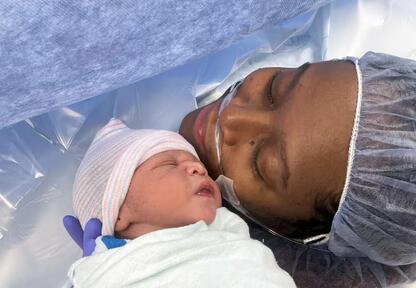Amani Odom, a 27-year-old mother from New York City, faced a life-threatening condition just days after giving birth to her second child.
The new mother thought she might be having a heart attack when she experienced sudden, severe chest pain and discomfort in her neck.
“I was gasping for air and gripping my chest,” Odom told TODAY.com. “My partner thought I was having a panic attack, but I knew something was really wrong.”
Odom had just given birth to her son Kayden through a C-section on May 24. Five days later, intense neck pain led to her chest pain.
This was not just a panic attack; Odom was diagnosed with a postpartum aortic dissection, a serious and often fatal condition that requires urgent heart surgery.
In the emergency room, Odom learned that her heart was enlarged and there was pooling around it. Initially, doctors suspected a blood clot or other issues, but further tests revealed a tear in her aorta.
According to the source, this critical condition required immediate surgery.
“I was terrified,” Odom recalls. “The heart is vital, and I was thinking the worst. But I tried to stay positive.”
On May 30, doctors at Mount Sinai performed surgery to repair the tear in Odom’s aorta. Despite the trauma her body had just gone through, she woke up feeling better than expected.
Her positive attitude and humor helped lift the spirits of those around her during her recovery.
“I had everyone in stitches with my jokes,” Odom said. “I was determined to stay positive, and I was grateful to see my children again, especially after such a close call.”
Aortic dissection is a rare but severe condition where a tear occurs in the aorta, the major artery from the heart.
According to Dr. Ismail El-Hamamsy from Mount Sinai, it’s often unrecognized and can be deadly if not treated promptly. Symptoms include intense chest pain, upper back pain, and difficulty breathing.
Dr. El-Hamamsy explained that Odom’s quick response to her symptoms likely saved her life. “Aortic dissections are not well-known, but they can be extremely dangerous,” he said.
“Early detection and treatment are crucial.”
Pregnancy can increase the risk of aortic dissection, especially if there is an underlying weakness in the aortic wall.
For Odom, a combination of factors likely contributed to her condition, making her case a poignant reminder of the risks associated with childbirth.
Read more news:
- Biden Campaign Mobilizes Across Georgia Ahead of Debate Clash
- Kristi Noem Denies Formal Vetting for Trump’s VP, Focuses on Winning Strategy
After her surgery, Odom was relieved to return home and be with her family. She acknowledged the support of her partner and doctors, who were amazed at her recovery.
Her story highlights the importance of being vigilant about one’s health and seeking medical help when something feels wrong.
“I hope my experience encourages others to take their health seriously and advocate for themselves,” Odom said. “It’s important to be there for your family, and taking care of yourself is a big part of that.”

